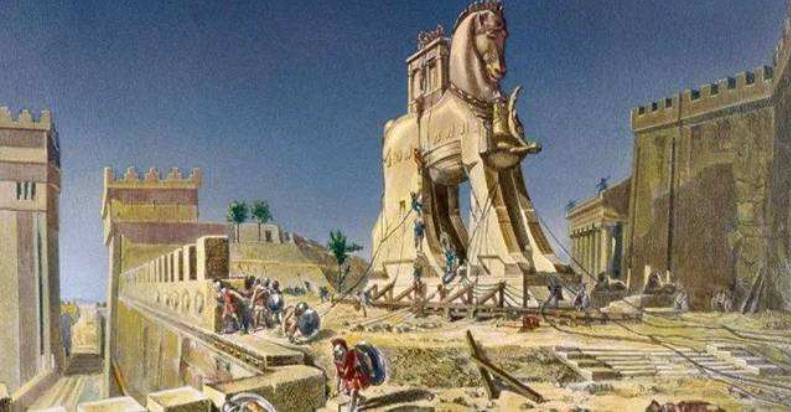For nine days the people of Troy gathered wood,
九天里,特洛伊人收集木材,
and on the tenth they laid Hector upon the pile and lighted a fire beneath it.
第十天的時(shí)候,他們把赫克托耳放在木堆上,然后在木堆下點(diǎn)起了火。
When the body was burned, his comrades gathered the bones and laid them in a chest of gold.
當(dāng)尸體被火化后,他的戰(zhàn)友們收集了他的尸骨并放在一個(gè)金箱子里了。
This they covered with purple robes and put in a great coffin, and upon it they laid stones many and great.
他們又用紫袍包裹起來(lái)箱子,放在一個(gè)大棺材里,他們又放了很多大石頭在棺材上面。

Over all they raised a mighty mound. Thus they buried Hector, defender of Troy.
一切結(jié)束之后,他們堆了一個(gè)巨大的墳?zāi)埂H绱耍麄兟裨崃撕湛送卸芈逡恋谋Pl(wèi)者。
But for Achilles the day of doom was not far distant.
但對(duì)阿喀琉斯來(lái)說(shuō),劫數(shù)之日也并不遙遠(yuǎn)了。
When he was born, his mother, Thetis, hearing it said that his life would be short and glorious,
當(dāng)他出生的時(shí)候,他的母親忒提斯聽(tīng)說(shuō)他的生命短暫而輝煌,
nevertheless wished for him a long life, even if it were not heroic.
盡管如此,他的母親還是希望他長(zhǎng)壽,即使不是英雄那般的。
So she took the babe to the river Styx and dipped him in its waters.
于是她把孩子帶到冥河邊,把他浸在河里。
Now the water of this river made the body of him who bathed in it proof against all wounds.
這河水被證實(shí)能使沐浴其中的人的身體不受傷害。
However, when Thetis dipped Achilles in the river, she held him by the heel, which alone remained untouched by the magic water.
但是,當(dāng)忒提斯把阿喀琉斯放進(jìn)河里的時(shí)候,她是提著他的腳后跟放進(jìn)去的,這是唯一沒(méi)被那神奇的河水浸沒(méi)的地方。
Therefore, his heel was not proof against wounds. When the war was renewed,
因此,他的腳后跟抵擋不了傷害。當(dāng)重新開(kāi)戰(zhàn)的時(shí)候,
and Achilles strove to break through the gates of Troy, Paris, whose act had caused the war,
阿喀琉斯奮力沖破特洛伊的大門(mén),帕里斯,引發(fā)戰(zhàn)爭(zhēng)的那個(gè)王子,
aimed an arrow which struck Achilles in the heel, for Apollo guided the hand of Paris.
有阿波羅指引著帕里斯的手,帕里斯用一支箭瞄準(zhǔn)并射中了阿喀琉斯的腳后跟。
So the greatest of the Greeks was slain on the very spot where he had killed Hector.
因此,這位偉大的希臘人死了,正好死在他殺死赫克托耳的地方。
For seventeen days the Greeks mourned over his body,
希臘人哀悼其遺體十七天,
and on the eighteenth day they gave it burial by the side of his friend Patroclus.
第十八日的時(shí)候,他們把他埋在了他的朋友帕特洛克羅斯旁邊。
Over them both the Greeks raised a great mound that was the wonder of men in after times.
在這倆個(gè)希臘人之上,人們修建了一個(gè)巨冢,那是后世人類(lèi)的奇跡。
HOW TROY WAS TAKEN
特洛伊是怎樣被攻城的
Besides Hector and Achilles,
除了赫克托耳和阿喀琉斯以外,
many other chiefs met their doom on the plains before the gates of Troy during the ten long years that the city was besieged.
在特洛伊城被圍困的十年中,許多首領(lǐng)在特洛伊城門(mén)前的平原上也遭遇了厄運(yùn)。
For the gods gave victory now to the one army and now to the other. At last Athena, always favoring the Greeks,
因?yàn)樯耢`們一會(huì)讓這支隊(duì)伍獲勝,一會(huì)又讓另一支軍隊(duì)勝利。最后,一向支持希臘人的雅典娜,
put a thought into the mind of the crafty Ulysses, one of the greatest of the Greek warriors.
給足智多謀的尤利西斯出了一個(gè)主意,他是希臘最偉大的戰(zhàn)士之一。
Under his direction a great horse of wood was built.
在他的指示之下,建造了一匹巨大的木馬。
The Trojans were made to believe that the horse was a peace offering to Athena
特洛伊人以為這匹馬是獻(xiàn)給雅典娜的和平禮物
in order that the Greeks might have safe return to their homes. In the body of the horse, however,
這樣希臘人也許就能平安回家。然而,在木馬里,
were hidden the bravest of the Greek chiefs. The rest of the warriors pretended to start for their homes,
躲藏著最勇猛的希臘首領(lǐng)。其他的戰(zhàn)士則假裝啟程回家,
but really went only as far as a neighboring island.
但實(shí)際上他們只是到了鄰近的一座島。











